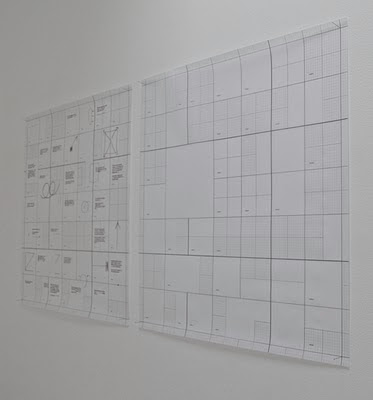A proposed conference paper (developed in collaboration with Rachel Lois Clapham) has been selected as part of the forthcoming PSi (Performance Studies International) conference #17, which is entitled Camillo 2.0: Technology, Memory, Experience. The proposed paper Re – (repeat, rework, rewrite, remember) will critically extend some of the debates and issues that have been emerging within our collaborative project, Re –
Image: Re- Reader, Rachel Lois Clapham and Emma Cocker, designed by Marit Munzberg.
Documentation of Re- (UNFIXED), part of UNFIXED, curated by RfRS at FlatTime House, London.
Documentation of Re- (UNFIXED), part of UNFIXED, curated by RfRS at FlatTime House, London.
Re – (repeat, rework, rewrite, remember)
Drawing on our ongoing collaborative project Re –, the performance document will be reflexively interrogated as a specific ‘technology of remembrance’, an interstitial site wherein technology, memory and experience collide. Re – is an iterative performance reading that responds to and is reworked against the specificity of each invitation to perform; it presses on two writers – and two writing practices – coming together to explore process, product and performance (of text). Re – is a conceptual framework for collaboratively exploring the tension between improvised/rehearsed; performance/document; live/recording; writing/written, the visible/invisible states of not knowing within the performed act of writing, through the collision of spoken, textual and gestural languages. Each performance stages the archive (save as) of its own coming into being, which in turn contains the trace of previous iterations. The work puts into question the relation between rehearsal, performance and documentation by blurring the line between these phases of practice, declaring them unstable categories. Each Re – reading enacts the making of its own documentation; the performance is also already the documentation of earlier dialogic thinking and making processes: there is always something that comes before. The documentation archives what is taking place whilst anticipating future action; existing as record of the ‘becoming past’ whilst intimating towards an unknown future moment, as a starting point or instructive score waiting to be inhabited again (differently). Re – explores the impossibility of singular, panoptic forms of documentation (and knowledge) that attempt to capture and archive the totality of an event, focusing instead on performance document as fallible fragment, where (analogous to memory) the shattering or splintering of documentation into manifold parts resists reassembly or recollection, remaining partial, incomplete. Counter-intuitively, perhaps, increasing the ways of documenting or archiving performance results in it being less known or knowable, less easy to grasp – evermore contingent. Fragments of documentation fragment and disperse any coherent memory of the originary event; overwhelming … losing … forgetting … editing something out in the process. However, each fragment potentially operates as a germinal ground, a graft from which new or unexpected lines of flight might materialize. We will examine how failure or indeed refusal to fully save as can thus be generative, creating productive gaps for (re)making or reworking a performance anew.
